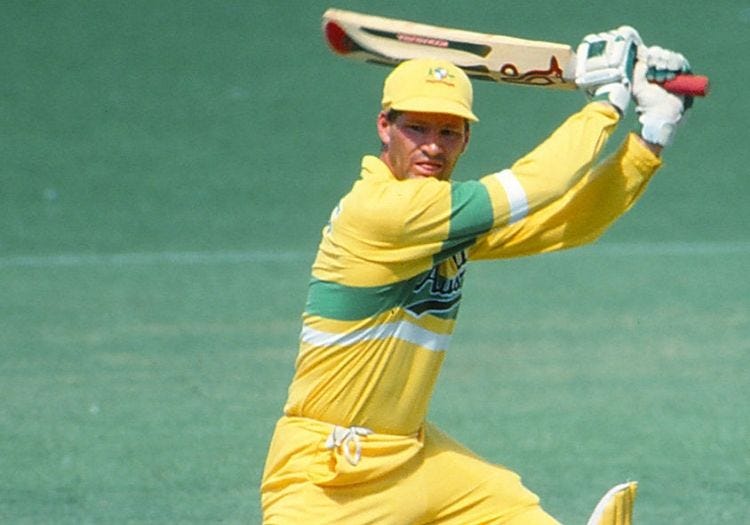Tall poppy syndrome, more 'Bumble' Lloyd, Dean Jones ... and a bonus vocal performance.
Also a look (and listen) to the late, great, Dean Jones. No doubt a victim of 'tall poppy syndrome' himself - "Jones wrote the book on one-day cricket - literally.”
This week we had more Boris Johnson of the top. Followed by some genial Canberra bashing, and then a more serious character assessment of David ‘Bumble’ Lloyd. Rob finally tabled one of his pet projects - the ‘tall poppy syndrome’ - featuring the late, Dean Jones. An introduction of music profiling in the second half caught me off-guard, especially when Rob broke into song, and I was cornered into revealing my Keith Urban liking. Finally, we squeezed in Patrick Dangerfield’s (Geelong FC) - 300th game, this Saturday at GMHBA Stadium.
Anyway, please put in the pods, and try to enjoy 30 minutes of varied discussion with Geelong radio host Rob Cameron (The Pulse 94.7) - recorded Monday 15th August, 2022.
Enjoyed the listen? It would be great if you shared it with your friends.
Dean Jones - (1961-2020)
Rob and I discussed the conundrum that ‘tall poppy syndrome’ presents.
Popular definition points to: a perceived tendency to discredit or disparage those who have achieved notable wealth or prominence in public life. In the case of sport, achievements replace wealth. And, when you narrow the definition down to Australia, and Australians, you find: tall poppy syndrome refers to a tendency for Australians to downplay achievement to the extent of being disdainful of such people, and so to cut them down to size.
We established, or Rob did, that here in Australia “we love our heroes,” but there are a set of “unwritten rules” on how heroes should behave. Allan Border (AO) was the quintessential hero, always giving his best, rarely complaining, constantly putting his teams gain before his own. Although, it should be noted, grumpiness did come easily to Border.
Then, on the other side of the coin, we discussed the late, great, Dean Jones.
Jones was every bit the opposite of Border, I believe, mostly due to his personality. Jones was energetic to the point of manic nervousness. In my view, he was an ambivert, contrary to the widely perceived belief that he was an extrovert. Like many players who played in this era, Jones said what others merely thought. Unlike now, though, he was an outlier in his era. Coaches and management were not versed in the modern practices of embracing all personalities, and allowing individuals to push forward a teams compass. Consequently, Jones, was hung out to dry. In the main, he was loved by his teammates, and loathed by the gate-keepers. I, and I’m sure many others, would give anything to watch Dean Jones play today.
SpeakingNick is a reader-supported publication. To receive new posts and support my work, please consider becoming a subscriber.
Quoting ESPN Cricinfo “Dean Jones wrote the book on one-day cricket - literally.” Also, “He played a new game in which he walked down the pitch to fast bowlers, ran frenetically between wickets and turned out-fielding into an attacking occupation.”
I love the line ‘turning out fielding into an attacking occupation’. Statistically, in white-ball cricket, more run-outs come from the out-field, than the in-field. He was before his time.
And his numbers: 3631 Test runs at an average of 46.55, with 11 hundreds from only 52 Tests. 6068 One-day international (ODI) runs at an average of 44.61, with seven hundreds and 46 half-centuries. Interestingly, his strike-rate (SR) in ODI cricket was 72.56, maybe not as high as you might think. In modern-day currency you could estimate this would be in the nineties range.
Dean Jones is sorely missed in many quarters. I plan to re-verse a story I wrote in 2013, for this weeks “Thank god it’s Friday” post. Dean Jones is in the thick of it.
*Thank you to The Pulse 94.7 for giving me the opportunity to speak with Rob and Loretta on a weekly basis*
Been forwarded this post? Sign up to receive it free.
As always, thank you, the reader (listener), for being here.






